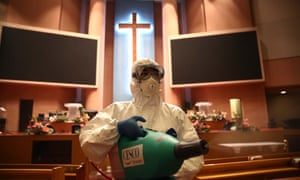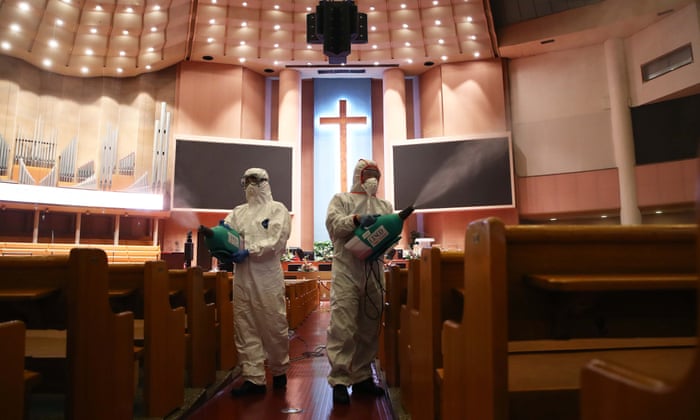Prayers Cannot Protect From the Virus
 |
| Yoido Full Gospel church, Seoul. Photograph: Chung Sung-Jun/Getty Images |
"May they point fingers at our churches as the epicentre of the coronavirus, we will stick to our principles and stand firm in front of our God.""Except for a few rule-breakers, most churches, including ours, have been carefully observing health rules at excruciating emotional and financial cost.""Enforcing these restrictions unilaterally upon all Protestant churches, this is nothing short of communism."Reverend Seog Sang-woo, pastor of Gyesan Jeil Church, Incheon city"Services or prayers may bring peace of mind, but they cannot protect people from the virus.""I believe all religions should accept the fact that epidemic prevention and control does not belong in the realm of faith but that of science and medicine."South Korean President Moon Jae-in"South Korean churches where pastors exercise big influence on congregants are a breeding ground for populist Christian leaders who manipulate the power of faith for political gains.""The conservative pastors confronting the government's virus control measures are basically outsiders, but their outspokenness leads them to overrepresent the entire Protestant church."Kim Hae-kwon, professor of Christian studies, Soongail University, Seoul
In February, the messianic Shincheonji Church of Jesus was responsible for producing South Korea's earliest, largest cluster of coronavirus infections. No fewer than a whopping five thousand cases were traced to the church's activities. Another cluster linked to close to 1,200 infections broke out at another megachurch. Health officials cited an anti-government rally led by the pastor of the church, the Reverend Jun Kwang-hoon last month, when 585 infections resulted.
Reverend Jun holds services and anti-government rallies. Some of his parishioners chose not to respect coronavirus testing requirements. To spite the authorities, they undertook to aggravate transmission, according to health officials, taking their lead from Reverend Jun, himself accused with defying health rules.In-person services following the February Shincheonji outbreak were banned by the government. When viral transmission receded the restriction was briefly lifted then re-instated in August following the outbreak at the Gyesan Jeil Church.
The Gyesan Jeil Church is a six-story building, sterilized three times weekly. The 670-seat worship hall held 20 churchgoers sitting distanced from one another on a recent Sunday. The hall, according to Reverend Seog, can accommodate 150 congregants with distanced seating, leading him to complain that the government capped attendees to a maximum number of 20 for all churches, large and small. Diminishing donations are biting into the churches' bottom line.
South Korean Christians who represent 28 percent of the population, have become the focus of pandemic controversy where President Moon held the Protestant churches responsible for two waves of the coronavirus infections. His is a centre-left government, and most of the Christian congregants are of a conservative persuasion. President Moon met with leaders of the Protestant groups, requesting compliance of them for the greater good of the entire country.
At that meeting the head of the United Christian Churches of Korea, Reverend Kim Taeyoung, apologized for the outbreaks, but expressed concerns over "government control over religious freedom", asking President Moon for greater flexibility for those churches with larger accommodation to space out their congregants during services. "Religion might be a pastime for some but for many of us, religious freedom is a value that cannot be surrendered even if it costs one's life", he stated.
 |
| Rev. Jun Kwang-hoon, who is the head of the Sarang Jeil Church in Seoul, which is at the center of the new wave of infections, speaks to the media Monday before being imprisoned. | YONHAP / VIA REUTERS |
The issue, presumably, is that where one group's rights are a heightened concern for compliance, their indifference to the wider concern of the rights of the entire population leads to an outcome where everyone is placed at risk. Although mainstream Protestant groups have distanced themselves from the Shincheonji church as a cult, and agree that the state-imposed ban is logical for those churches breaking health rules, it is not fair, they contend, for those that have followed the health guidelines.
Proving that old adage that you can please some people some of the time, but never all of the people all of the time. Applying a selectively negative injunction against those defiant of the greater good may please the law-abiding, but it is grist for the defiant who then claim themselves to be marginalized, overlooked and discriminated against. A situation where nobody wins and to keep everyone from losing, an even-handed response treating all sectors equally becomes the only option.
South Korea's record on coronavirus control has largely been one of success. To please a minority there is the danger of abandoning the need to protect the majority. This is what has occurred in Israel which initially brought their coronavirus case load under control, then relaxed the rules. Its ultra-Orthodox community flouted health rules meant for everyone, the government hesitated to impose selected lockdowns and the entire country is now experiencing a rampant case load and is returned to lockdown.
 |
| Disinfection workers wearing protective clothing spray antiseptic solution in an Yoido Full Gospel Church in Seoul. Photograph: Chung Sung-Jun/Getty Images |
Labels: Novel Coronavirus Cases, Protestant Evangelical Churches, South Korea

<< Home